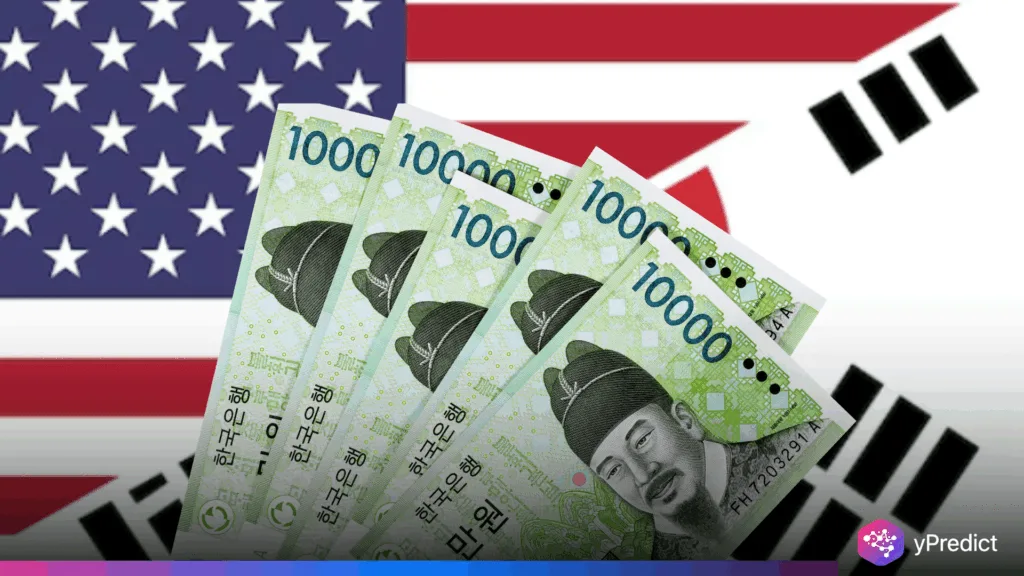
South Korea has approached the U.S. with a request for an unlimited currency swap offer. The whole point? Seoul wants to prevent excessive volatility in the won, especially with these high-stakes trade talks going on. At the center of the negotiations, there’s this $350 billion investment package and some possible tariff adjustments on the table. South Korean officials are pushing hard, saying that the move is critical to ease pressure on their foreign reserves. Also, this move is essential for keeping markets stable during what could be a bumpy ride.
South Korea Strengthens Case For Currency Swap Offer
Finance officials are growing increasingly concerned that Washington’s push for more cash-based investment could trigger significant outflows of dollars. So, this is putting pressure on the won and making the currency vulnerable. They see a currency swap offer as an essential security measure. Thus, this would step in when exchange rates start to fluctuate and keep things steady.
For proof, just look at Japan. Their permanent swap line with the U.S. acts as a stabilizer for the yen during market turbulence. Korean policymakers are quick to point out that, unlike Japan, they lack adequate foreign reserves to deal with such emergencies.
Presidential Policy Secretary Kim Yong-beom made it clear: the gap between Korea’s and Japan’s reserves is a real sticking point. For Seoul, having that swap buffer setup is crucial, especially with significant agreements in negotiation that could impact the currency market.
Will Trade Talks Ease Tariff Pressure Soon?
Seoul is aiming to channel $350 billion into U.S. projects, with one big ask in return. They would like Washington to give Korean goods a break by reducing tariffs from 25% to 15%. Plus, it would seem it’s straightforward, but naturally, negotiations become difficult.
The U.S. side? They’d much rather have direct cash injections or equity, not just promises or guarantees. Meanwhile, Korea is more inclined to offer loans or backstops, anything to avoid an immediate flood of capital flowing out of Seoul.
A key hurdle is Seoul’s push for an “unlimited” currency swap offer. It is basically providing security against currency volatility resulting from rapid cash movements. So, both sides are still going back and forth, and really, nobody’s putting ink to paper yet.
Even with South Korea’s substantial $416 billion foreign reserve stockpile, officials there aren’t taking this lightly. They have made it clear: a deal of this magnitude could easily strain their currency. Trade Minister Kim Jung-kwan has been vocal; without a swap arrangement, heavy outflows could damage the won and slam Korea’s industries.
Currency Swap Offer May Shape Future Deals
Negotiations are still at a standstill; investment amounts, profit allocation, and details on swap-line access are all sticking points. Washington? Still hasn’t taken a public position on Seoul’s request, so the proposal remains unresolved.
So, if the currency swap offer is approved, South Korea could protect itself from currency volatility. Also, they set a precedent for stronger FX safeguards in trade agreements. If not, the country risks sharper depreciation and potential political fallout. This could complicate the way similar deals are handled in the future.
Stakes for Seoul and Washington
South Korea’s currency swap offer highlights the urgency of these trade talks. With exporters suffering from tariffs, Seoul is hunting for mechanisms to shield its economy and protect national interests. There’s also that underlying concern about draining foreign reserves, especially as outbound investments hit record highs.
From Washington’s perspective, approving a swap line would mean supplying much-needed dollar liquidity. This could therefore facilitate this round of negotiations. If the deal stalls, you can bet Seoul might hit the brakes on some of those planned investments or push back with tougher demands.
The results won’t just set the tone for US-Korea business ties. They’ll likely impact how other countries approach currency risk in future trade talks. The market is now observing whether Seoul can secure investment certainty and financial stability or if a change will occur.







